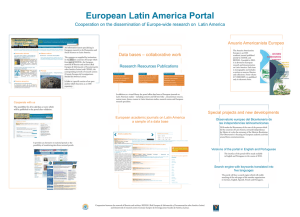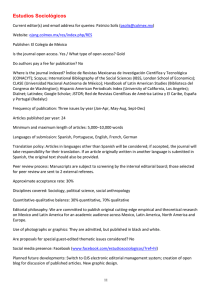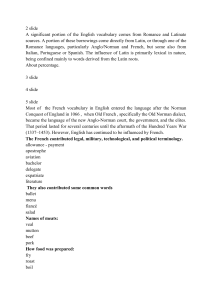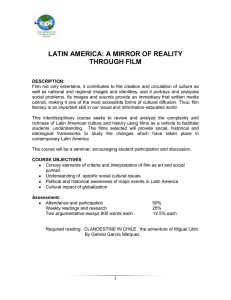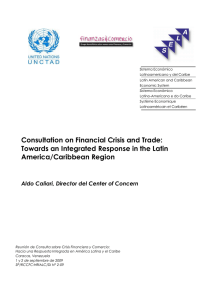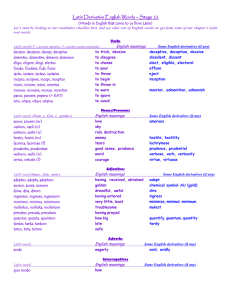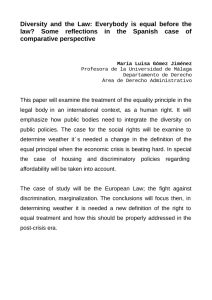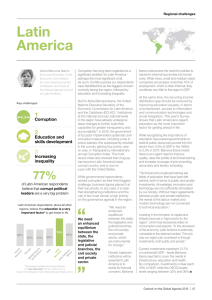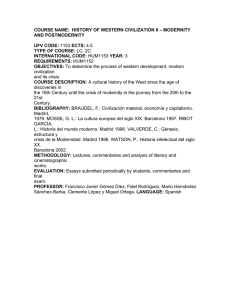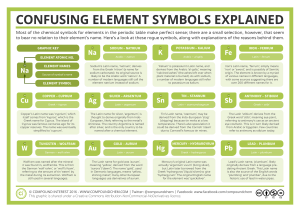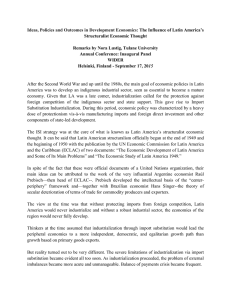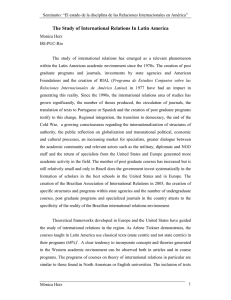Political Institutions and Actors in Latin America
Anuncio
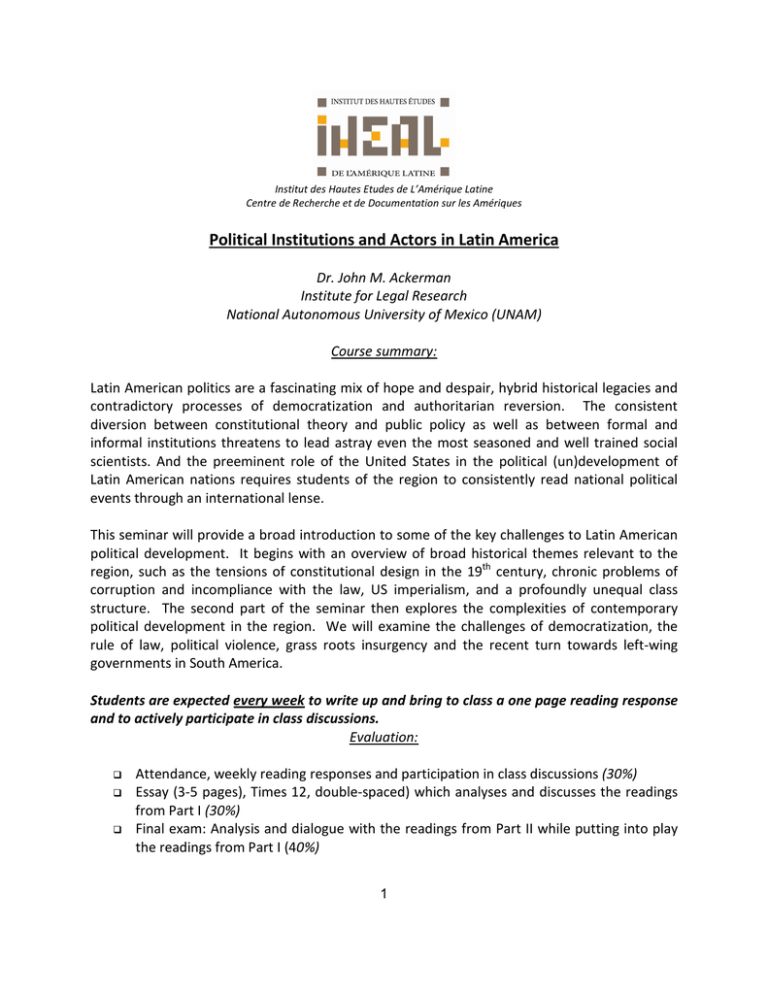
Institut des Hautes Etudes de L’Amérique Latine Centre de Recherche et de Documentation sur les Amériques Political Institutions and Actors in Latin America Dr. John M. Ackerman Institute for Legal Research National Autonomous University of Mexico (UNAM) Course summary: Latin American politics are a fascinating mix of hope and despair, hybrid historical legacies and contradictory processes of democratization and authoritarian reversion. The consistent diversion between constitutional theory and public policy as well as between formal and informal institutions threatens to lead astray even the most seasoned and well trained social scientists. And the preeminent role of the United States in the political (un)development of Latin American nations requires students of the region to consistently read national political events through an international lense. This seminar will provide a broad introduction to some of the key challenges to Latin American political development. It begins with an overview of broad historical themes relevant to the region, such as the tensions of constitutional design in the 19th century, chronic problems of corruption and incompliance with the law, US imperialism, and a profoundly unequal class structure. The second part of the seminar then explores the complexities of contemporary political development in the region. We will examine the challenges of democratization, the rule of law, political violence, grass roots insurgency and the recent turn towards left-wing governments in South America. Students are expected every week to write up and bring to class a one page reading response and to actively participate in class discussions. Evaluation: Attendance, weekly reading responses and participation in class discussions (30%) Essay (3-5 pages), Times 12, double-spaced) which analyses and discusses the readings from Part I (30%) Final exam: Analysis and dialogue with the readings from Part II while putting into play the readings from Part I (40%) 1 Readings: Part I: History and Context Session 1: Ernesto Garzón Valdés “Derecho y democracia en América Latina”, Isonomía 14, abril 2001, pp.33-63 Session 2: Roberto Gargarella, The Legal Foundations of Inequality: Constitutionalism in the Americas, 1776-1860, Cambridge University Press, 2010. Session 3: Greg Grandin, Empire’s Workshop: Latin America, the United States and the Rise of the New Imperialism, Henry Holt: Metropolitan Books, 2006. Session 4: Miguel Angel Centeno & Fernando López-Alves, The Other Mirror: Grand Theory through the Lens of Latin America, Princeton University Press, 2000 (First part) Session 5: Miguel Angel Centeno & Fernando López-Alves, The Other Mirror: Grand Theory through the Lens of Latin America (Second part) Part II: Contemporary Political and Institutional Transformations Session 6: Guillermo O’Donnell, Counterpoints: Selected Essays on Authoritarianism & Democratization, University of Notre Dame Press, 1999. (Chaps. 6-7) Session 7: Guillermo O’Donnell, Counterpoints: Selected Essays on Authoritarianism & Democratization, University of Notre Dame Press, 1999. (Chaps. 8-10) Session 8: Frances Hagopian & Scott Mainwaring (eds.) The Third Wave of Democratization in Latin America: Advances and Setbacks, Cambridge University Press, 2005 (pp.1-120) Session 9: Bill Robinson, Promoting Polyarchy (Nicaragua pp.201-255, Haiti pp. 256-316) Session 10: Elisabeth Jean Wood, Forging Democracy From Below: Insurgent Transitions in South Africa and El Salvador, Cambridge University Press, 2000. (pp.3-110) Session 11: Greg Grandin, The Last Colonial Massacre: Latin America in the Cold War (Updated Edition), The University of Chicago Press, 2011 (1-198, skim some sections) Session 12: Emir Sader, The New Mole: Paths of the Latin American Left, Verso, 2011. 2 Complementary Bibliography: ADELMAN Jeremy (ed.), Colonial Legacies: The Problem of Persistence in Latin American History, New York, Routledge, 1999. ALTMAN BORBON Josette (dir.), Alba, una nueva forma de integracion regional ?, Buenos Aires, FLACSO, 2011. Cannon, Barry and Peadar Kirby, Civil Society and the State in Left-led Latin America: Challenges and Limitations to Democratization, Zed Books, 2012 Ciccariello-Maher, George, We Created Chávez: A People’s History of the Venezuelan Revolution, Duke University Press, 2013. COMBES Hélène, Faire parti. Trajectoires de gauche au Mexique, Paris, Karthala, 2011. DABENE, Olivier (dir.), La gauche en Amérique latine, Paris, Presses de Sciences Po, 2012. Dalmau, R. Martínez, “El proceso constituyente boliviano (2006-2008) en el marco del nuevo constitucionalismo latinoamericano”, Oxfam, Gran Bretaña, La Paz, 2008 Esquirol, Jorge L., “The Failed Law of Latin America”, American Journal of Comparative Law, Vol. 56, p. 75, 2008. Garro, Alejandro, “Eficacia y autoridad del precedente constitucional en América Latina: Las Lecciones del Derecho Comparado”, The University of Miami Inter-American Law Review, Vol. 20, No.2 (Spring, 1999), pp. 473-512. KITSCHELT Herbert, HAWKINS Kirk, LUNA Juan Pablo, Latin America Party System, Cambridge, Cambridge University Press, 2010 Langer, Máximo, “Revolution in Latin American Criminal Procedure: Diffusion of Legal Ideas from the Periphery”, American Journal of Comparative Law, Vol. 55, p. 617, 2007. LINZ Juan, STEPAN, Alfred, The breakdown of democratic regimes, Latin America, Baltimore, Johns Hopkins University, 1978 Niembro, Roberto (coord.), Constitucionalismo Popular en Latinoamérica, Porrúa-Escuela Libre de Derecho, México, DF, 2013 (primera parte) Pisarello, Gerardo, “Los derechos sociales en el constitucionalismo democrático”, Boletín Mexicano de Derecho Comparado, Número 92, p.152, 2005. 3 Rodríguez Garavito, César (coord.), El derecho en América Latina: un mapa para el pensamiento jurídico del siglo XXI, Siglo XXI Editores-Igualitaria, Buenos Aires, 2011 (Primera y segunda parte) Serna de la Garza, José María (coord.), Proceso constituyentes contemporáneos en América Latina: tendencias y perspectivas, Instituto de Investigaciones Jurídicas, Universidad Nacional Autónoma de México, México, DF, 2009. Vellinga, Menno (coord.), El Cambio del Papel del Estado en América Latina, Siglo XXI Editores, México, DF, 1997. (primera parte) Viciano Pastor, Roberto y Martínez Dalmau, Rubén, “Aspectos generales del nuevo constitucionalismo latinoamericano” en El nuevo constitucionalismo en América Latina. Corte Constitucional del Ecuador, Quito, 2010. . . 4
